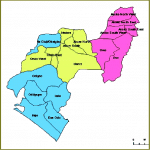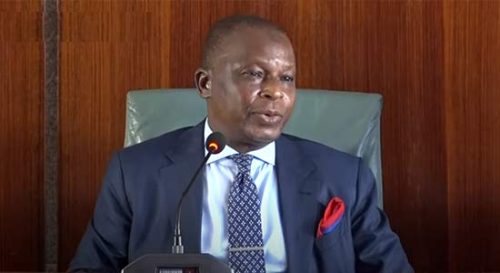Curbing open defecation through dry drum pit latrines

Open defecation is the practice where people go out in fields, bushes, forests, open bodies of water and other open spaces rather than use the toilet to defecate or pass bodily waste. It constitutes a major public health problem due to rapid urbanisation, lack of public toilets and low level of awareness.
According to 2018 NORM Report, 47 million Nigerians do not have access to toilets. The report revealed that while 75 million use unimproved toilets, 1 in 4 Nigerians lack access to basic toilet.
These Nigerians according to the report include vulnerable women and children who suffer as a result of consuming contaminated water or food and living in unsanitary conditions.
The report further revealed that while 32% of these Nigerians live in the rural areas, 39% are from the poorest household.
Most unfortunately, the psychological and physical demands placed on millions of women and girls who do not have proper sanitation facilities are overwhelming.
Aside from suffering from humiliation and indignity, women and girls who relieve themselves outside try to maintain their dignity and privacy by choosing to relieve themselves at night time.
Regrettably, in their attempt, the women and girls become prey to rapists, molesters, and physical abusers they are subject to daily threats of sexual violence.
Lack of proper sanitation facilities makes it even more traumatic for women, especially when they are pregnant, during postnatal periods, and while menstruating.
Additionally, open defecation causes many preventable diseases, such as polio, hepatitis, typhoid, cholera, diarrhoea, under nutrition; reduced physical growth and it weakens cognitive function.
The People of Ottonlama, Okpobo, Aya-Ama, Okorotu all in Nkoro local government area in Rivers State were before now defecating in the open before the Intervention of European Union (EU), and the United Nations Children Fund, (UNICEF) through “Dry Drum Pit Latrines”.
A visit in some of the communities in Rivers State by our reporter revealed what the people of the community most especially women and girls were going through before Succour came their way through the construction of “Dry Drum Pit Latrines” by EU in collaboration with UNICEF.
According to Ngereb Dickson, WASH com Secretary in Ottonlama community, Nkoro local government area, about six of the dry drum pit latrines have been provided to serve the community.
Explaining how the People use the facilities, he said, “Each time the two drums get filled up, we get the young ones in the community to dig the ground where the faeces are usually buried.
“There is a great change now because we don’t go about marching on faeces on the road. This was very common but the situation has changed”.
Also Ms Maltida John of Okpobo community told the Daily Times how she usually have to wait until night fall to ease herself in the bush.
Narrating her experience, she said that before the construction of “Dry Drum Pit latrines” by EU/UNICEF for the community, they were faced with a lot of health hazards varying from cholera, diarrhea etc.
She said, “I had a bad experience while I was tooling sometime ago. I had to clean my bathing bucket to convert it to my personal toilet because I could not wait until night fall to defecate in the bush.
“However, the situation is different today because the dry drum pit latrines are always handy and we usually ensure that they are kept clean always. I thank UNICEF and EU for the kind gesture and I am also calling in the Federal government not to abandon us”.
For her part, Deaconess Antonia Alan said, “before, we used to defecate anywhere, then flies would come upon it and carry it to our food. When we eat the food we become sick.
But today, things have changed, we no longer fall sick like before because we now use toilet”.
“Before now I used to excrete in polythene bags and disposed it in dustbins on the streets or in the bush” this was the confession of Florence Kingsley.
She added that her children used to fall ill but the situation has changed since they imbibe the habit of healthy hygiene and use of clean toilets.
According to Mr. Zaid Jurji, Chief of Water, Sanitation and Hygiene (WASH) department of UNICEF, Nigeria losses N455 billion annually due to poor sanitation practised around the country.
Jurji who spoke during a media dialogue on WASH organised by the Federal Ministry of Information, in collaboration with the European Union (EU) and UNICEF on Monday in Port- Harcourt, the Rivers State capital,
Jurji said that the real cost that Nigeria losses annually amounts to N455 billion due to poor sanitation which results in deaths, low productivity and ill-health suffered by Nigerians.
He said, “Nigeria losses N455 billion every year as a result of poor sanitation which escalates to deaths, stunting, malnutrition, loss of dignity, insecurity, low productivity and loss of GDP”.
Jurji explained that access to basic water and sanitation services in the Nigeria facilities such as communities, school, Hospitals, and markets/parks are 20.4 percent, 17 percent, 22.7 percent and 12.4percent respectively, adding that 47 million Nigerians still practise open dedication.
He lamented that sanitation sector in Nigeria is severely under resourced, with only 19% of WASH budget annually, adding that it would be very difficult to meet the Sustainable development goals in 2020.
He said “Only 20.1% of households have a fixed place for unleashing facility with soap and water. 10.4% households have suffered diarrhoea in the past 6 weeks, 75% are children under 5 years. Only 6.4% of households are likely to practice proper hand washing (with water and soap), at critical times.
“The key issues of the sanitation sector in Nigeria includes low political and financial commitment, low private sector participation, weak institutional arrangement and limited technical know-how, lack of technology to meet geographical condition
“Nigeria has a population of 198 million and 93 million children. 1 million Nigerians under the age of 5 die annually as a result no proper sanitation. 20.4% of the population have access to basic water and sanitation services. That is those using improved sanitation Facilities.
“17.0% of schools have access to basic supply and sanitation services that is schools with functional and improved toilets and latrines available at all times.
22.7% of health facilities have basic water supply and sanitation services. 12.4% of markets and motor parks have basic water supply and sanitation services,” Jurji added.
While stressing that only 11% of the systems meet the minimum requirements for WASHCOM, frequency and tariff, the UNICEF chief added that about 130 million people in Nigeria are without proper access to sanitation.
“34.6% (66million) have improved latrines. 4. 4% (8.4 million Nigerians have improved latrines, private, functional and accessible to the people. 20.4% (39 million) unimproved latrines, Hygienic separation of human faeces from human contact.
“5.5% schools have basic gender sensitive WASH services, functional water facilities and durable improved toilets with separate blocks for males and females available. 49.3% schools have at least one improved toilets and latrines.
33.6% health facilities have hand washing facilities with soap and water. 43.2% health facilities have functional improved water supply in the premises,” he added.
Earlier, Engineer Emmanuel Amatemeso, Acting Permanent Secretary, Ministry of Water Resources, Rivers State, who represented the Commissioner for Resources, Kaniye Ebeku, commended UNICEF and partners for what they are doing in the state but urged them to increase funding in the state because of the peculiar nature of the state.
He said Rivers State has a peculiar area that makes it very expensive to transport materials to project sites and added that there is need for UNICEF and partners to beef up their activities in the state.
On her part, Eliana Drakopoulos, Chief of communication, UNICEF, in her remarks, said that the WASH programme aims at improving feeding, hygiene and sanitation to reduce stunted growth and malnutrition in Nigeria, adding that UNICEF will focus more in ensuring early education for children and reduce violence against children.
She added that 130 million of the Nigerian total population lacks access to proper sanitation, with 93 million children where 1 million children under age 5 die annually and 1 out of every 4 routinely vaccinated.










